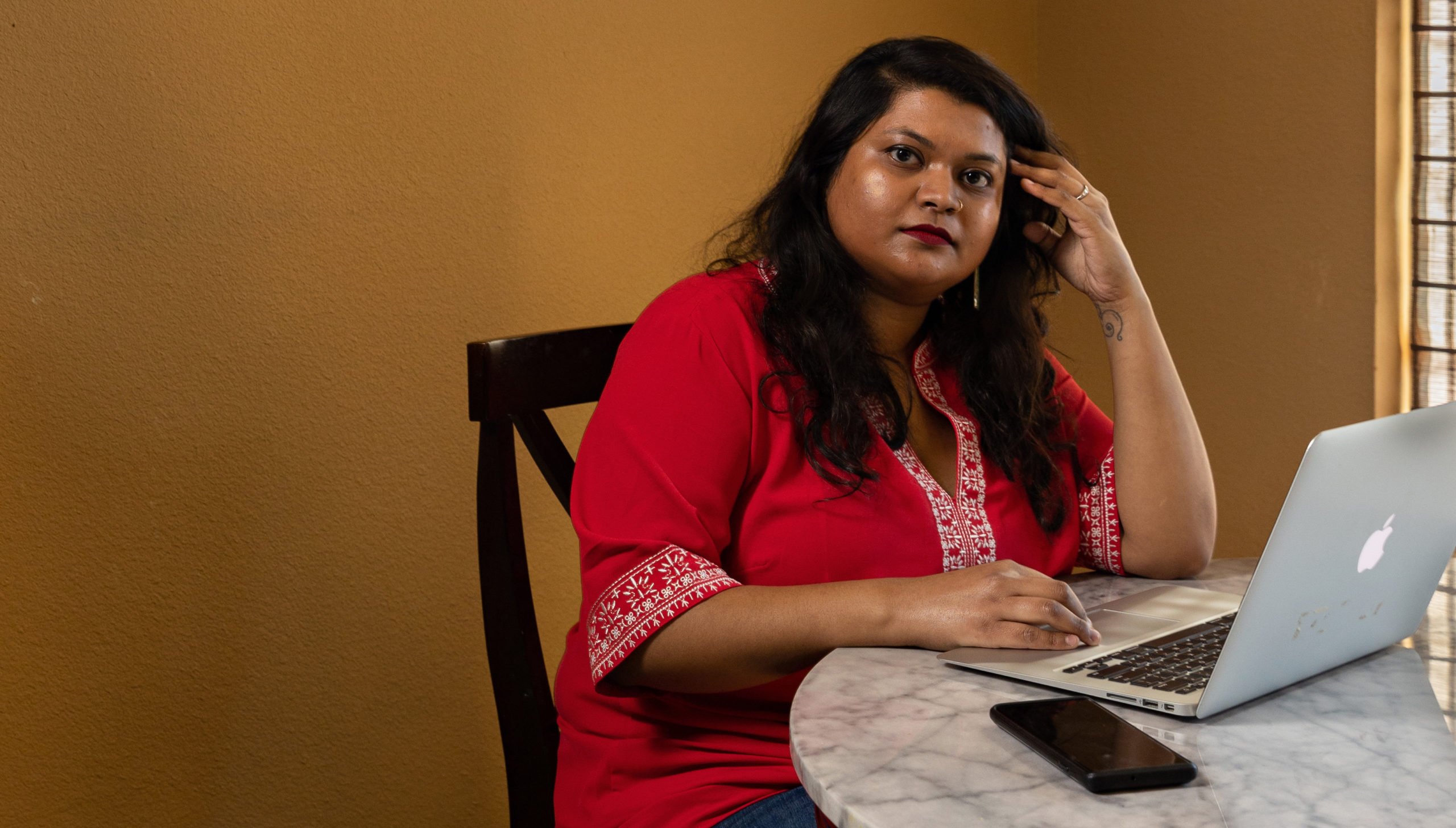
Texting for Reproductive Justice
At the Texas Equal Access Fund, volunteers help Texans navigate a reproductive health network devastated by Senate Bill 8.
A version of this story ran in the May / June 2022 issue.
From her kitchen table in McKinney, just north of Dallas, Mohini Lal spends a good portion of her weekends intently pouring over case files and answering Slack messages as her young children pay on the floor beneath her.
“It looks like what I think a regular Saturday or Sunday looks like for most people—it’s just that I’m on my phone and helping people get abortions,” Lal says.
As a volunteer for the Texas Equal Access Fund’s text message hotline, Lal fields questions from dozens of Texans during a typical 12-hour shift. More than six months since the state’s near-total ban on abortion, Senate Bill 8, went into effect, she and other activists across the state have had to ramp up efforts to help facilitate access. A recent study showed that the number of procedures performed in Texas dropped by half compared to the previous year in the month after the law was passed.
“If you’re thinking about what you need to do to send a text, it’s something that you are doing because you need information quickly,” Lal said. “People are sharing very personal information with you through a chat format because it’s simplest, but that doesn’t make it any less vulnerable for them.”
Among the most common questions she receives:
“Can you be arrested for getting an abortion?” (No, the law lacks an enforcement mechanism other than lawsuits.)
“Can the person getting an abortion be held liable?” (No, just those who help them.)
“Is all abortion illegal in Texas?” (It’s complicated: Technically, no—only those performed after about six weeks of pregnancy, when a fetal heartbeat is detectable. However, most women don’t know they’re pregnant until several weeks after conception. Waiting periods and mandated intake appointments make it even more difficult for someone to act in that timeframe.)
The TEA Fund also has a call-in hotline. But for some, texting lowers the barrier to access. Rather than answering questions verbally over the phone that can cause feelings of vulnerability, patients can text to avoid some of the embarrassment or shame they may feel because of social stigma.
In addition to informing people about where they can get an abortion, Lal lets clients know if funding is available to help them pay for the procedure. Sometimes, she refers them to counselors or post-abortion support groups for help with the emotional healing process.
The TEA Fund, which provides service to 110 of Texas’ 254 counties, helps patients navigate the added financial barriers created by the new law. The procedure alone can cost upward of $1,500, but because most abortions can no longer be performed in state, many Texans must now travel hundreds of miles for healthcare—a journey that carries large associated travel costs. Around 75 percent of the TEA Fund’s clients now seek abortions out of state, compared with 25 percent before the passage of SB 8.
The TEA Fund works with a network of at least a dozen funds that cover travel or medical expenses. Other travel-specific funds, like Fund Texas Choice, will go so far as to book bus or plane tickets on behalf of clients.
The new law places a $10,000 bounty on the head of anyone who “aids or abets” an abortion, which could include someone who drives a patient to a clinic, pays for medical costs, or performs the procedure outright. It empowers anyone, including out-of-staters, to file lawsuits against violators in pursuit of the reward. It does not include exceptions for rape or incest.
That power has only been exercised a handful of times—all against a San Antonio doctor who publicly announced, in defiance of the ban, that he’d performed an abortion six weeks after conception. Nevertheless, fear of enforcement has been enough to decimate most abortion services throughout the state.
“Any work that we do could be construed as ‘aiding and abetting’ because the law is broad, but we are doing what we think we can within the confines of the law,” said Kamyon Conner, the TEA Fund’s executive director. “This law is broad purposefully to intimidate funds and providers as well as basically put us out of business based solely on the fact that we help people access abortion.”
Despite the added risks, said Charlie Hughes, the TEA Fund’s volunteer intake director, interest in volunteering rose after the governor signed SB 8 into law, likely due to increased awareness of abortion restrictions driven by media coverage of the new law. Sixty volunteers currently work with the organization.
“There are a lot of people living in communities that are hostile to abortion.”
Lal said she is privileged to be able to volunteer without much fear, but understands why the law causes alarm and uncertainty about accessing reproductive healthcare, especially for people who belong to traditionally marginalized communities.
“I am a person of color—I’m an Indian immigrant—but I’m also married to a white person,” Lal said. “I have parents who have financial privilege, and I have financial privilege myself. I’m an attorney, so I know the law. If I didn’t have all those privileges, I could absolutely see why someone would be afraid of this new reality.”
More than two-thirds of the people who receive financial assistance from the TEA Fund are people of color, who often face higher financial and informational barriers than other groups. Because of this, Lal said, they are especially vulnerable to misinformation.
“Not everybody knows which news sources are trustworthy,” she explained. “There are a lot of people living in communities that are hostile to abortion. The information they get is going to look a lot different from somebody who’s very keyed-in.”
Still, SB 8 has taken a toll on Lal, who experiences patients’ trauma vicariously, encountering them during difficult moments in their lives. Clients recount stories of unwanted pregnancies, failed birth control, sexual assault, and domestic abuse and violence.
Lal said many of those who reach out don’t see carrying their pregnancies to term as an option. More than 60 percent of the TEA Fund’s clients already have at least one child. Even adoption, which some anti-abortion groups argue is a viable alternative to abortion, presents challenges, including medical costs and the toll pregnancy takes on a body—not to mention the trauma of having an unwanted pregnancy itself.
For Lal, who grew up in Texas, reproductive rights have always been an important part of her values. After turning 18, she signed up to become a clinic escort in Chicago, where she attended college. Her time continuing this work t in other states helped solidify her views on access to abortion, though Texas’ restrictions are unprecedented. As she walked with patients from their cars to the doors of abortion clinics, she would sometimes listen as anti-abortion protestors hurled insults and falsehoods in their direction.
“The experience of getting an abortion should be like the experience of getting a root canal: You walk in, a medical professional does their job, and you walk out having gotten the healthcare you need,” Lal said. “I know that there are all these made-up things standing in people’s ways, making it harder for them to live their lives and get the healthcare they need. And as much as I can do to remove those barriers, I want to do it.”



